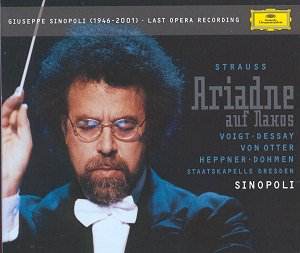Billed by DG as Giuseppe Sinopoli’s last opera recording,
this star-clad Ariadne acts as a reminder of all the strengths
of this cruelly-underrated conductor/composer (underrated in the UK,
at least). Here, in sound, is surely the best way to remember him. In
his elucidation of textures and his inspiration of both singers and
orchestra to give their all, there can be few finer testaments to his
achievements.
Here is a case of star singers gelling together to
make a whole which is greater than the sum of its parts. Ariadne
is notoriously difficult to bring off, but when it succeeds it impresses
as one of Strauss’s greatest post-Rosenkavalier achievements.
True, there is an element of compositional braggery in the virtuoso
combination of the Commedia dell’arte Prologue and the
more Wagner-influenced mythology of the opera proper (or of opera buffa
and opera seria, if you prefer), but one is so engrossed in the experience
one can only emerge breathless with admiration. To succeed as a performance
(particularly on disc, shorn of any visual ‘props’), the threads have
to be brought together by a master. Sinopoli joins the pantheon of the
greatest interpreters on disc of this piece, without in the final analysis
earning an outright recommendation.
The presence of members of the Dresden Staatskapelle
is no mean bonus, for this was Strauss’ ‘favoured’ orchestra (he referred
to them as his ‘beloved Dresdeners’: the Alpine Symphony is dedicated
to them). Although this orchestra did not premiere Ariadne (that
privilege went to Stuttgart), Dresden’s Semper Oper was the second venue
to present it, in November 1912.
Strauss’s chamber-like textures would seem almost to
have been written with Sinopoli’s X-Ray deconstructionist vision in
mind. Sometimes this approach could lead to controversial results, but
this is far from the case in the present instance: listen to the Overture
to the opera proper and you will hear a meltingly beautiful performance,
fully evocative of a mythological time past, yet at the same time fully
and unmistakably Straussian. The conductor’s tempi are consistently
convincing, the orchestra always beautiful in tone and shifts of mood
are positively chameleon-like in response to Strauss’ mood shifts.
Of course the two major roles of Ariadne (Primadonna
in the Prologue) and Bacchus/Tenor are crucial. Deborah Voigt (the former)
has extensive experience in Strauss and Wagner, and it shows. Her ‘Es
gibt ein Reich’ is given with the sincere authority of the deepest grief,
and she is superb in the final love scene with Bacchus. Bacchus enters
late in the opera and, when he does, has a cruel part to contend with.
Ben Heppner copes well with the high and mobile part, without being
fully the expressive equal to his Ariadne. If he is less involving than
Voigt, it is not so much as to detract from the experience: the whole
passage is imbued from the pit with tenderness. Indeed, it is Sinopoli
and the Dresdeners who carry the final moments. At the very end, Heppner
does raise his game to match his colleagues; Voigt is quite simply resplendent.
Natalie Dessay makes an appearance courtesy of EMI
Classics as Zerbinetta to give a stunning ‘Grossmächtige Prinzessin’
(it is hard not to break into spontaneous applause, even sitting at
home!). Dessay acts with her voice, whilst Sinopoli’s completely natural
pacing means that Zerbinetta’s scales and filigree emerge as perfectly
judged. This is Strauss singing of the highest calibre, as is the coquettish
contribution of Anne Sophie von Otter’s Composer (complete with exemplary
pitching).
Of the more minor, roles, Stephan Genz gives a noteworthy,
affectionate account of Harlekin’s song. The offstage trio of Naiad,
Echo and Daiad accompanying Ariadne’s penultimate statements is perfectly
balanced.
Certainly this is a major addition to the Strauss discography,
and a most distinguished exit from the recorded vaults of opera for
Sinopoli. Keep it alongside Karajan’s 1954 mono EMI performance (now
on EMI Great Recordings of the Century CMS5 67077-2), itself a magnificent
achievement with the Philharmonia Orchestra and a classic cast including
Rita Streich as Zerbinetta, Rudolf Schock as Bacchus and Elisabeth Schwarzkopf
as Ariadne. Kempe on EMI (CMS7 64159-2) is the other alternative, with
Gundula Janowitz as Ariadne. Perhaps Masur should also make an appearance
on the ideal Ariadne-shelf: another superb cast, headed this
time by the resplendent Jessye Norman in the title role (Philips 422
084-2).
Colin Clarke


